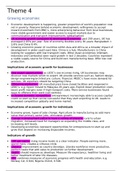Theme 4
Growing economies
Economic development is happening, greater proportion of world’s population now
not in poverty. Reasons behind economic development; willingness to accept
inward investment from MNC’s, more enterprising behaviour from local businesses,
more stable government and easier access to export markets due to
communication and transport improvements (globalisation)
UK economy growth compared to developing economies: past 200 years, UK has
averaged 2.25% per year. Size of economy doubles every 30 years. Bangladesh =
3.8% and China 9.4%.
Growing economic power of countries within Asia and Africa so a broader impact of
development in wider south east Asia. China is a hub. Manufacturers in China
looking for suppliers with low transport costs. Other Asian economies (Vietnam,
Indonesia and Cambodia) seen rapid growth in last 2 decades. Countries represent
a viable supply source for China and build own manufacturing base. Offer low cost
production.
Implications of economic growth for businesses
New export opportunities: as LEDC’s see incomes rising, UK businesses may
discover new markets which to export. UK provide services such as; fashion design,
design engineering/architecture, culture, financial. MEDC’s have more demand for
services. UK exporters should be targeting China.
Offshoring production: UK manufacturers have closed facilities and reopened in
LEDC’s. e.g. Dyson moved to Malaysia 20 years ago. Exploit lower production costs,
boost profit margins even if high transport costs. More service businesses found
ways to offshore their work (call centres).
Increased domestic competition: entrepreneurs increasingly able to access capital/
credit so start up that can be successful that they start exporting to UK. Leads to
increased competition globally and home market.
Implications of economic growth for individuals
Economy grows, types of jobs change. Agriculture to manufacturing as add more
value than primary sector jobs, stimulates growth.
Change in employment patterns have a variety of impacts: rural to urban
migration, increased need for managers so expanding the middle class, and
increasing skill levels.
Developing economies represent opportunities for entrepreneurs to start up and
grow that depend on increasing disposable incomes.
Indicators of growth
GDP per capita: rising income levels is a clear indicator. People earning more,
spend more, creates a virtuous circle.
Literacy: improvement as country develops. Literate workforce more productive,
perform tasks that add value to production so further development.
Health: should improve as develops. Measure life expectancy, healthier living and
better treatment of later life diseases.
HDI: combines measures of economic progress with health and education. e.g.
Norway 1st, 0.944, Nigeria 152nd, 0.504.





